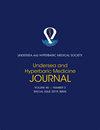慢性溃疡患者在 1.4 ATA 和 2 ATA 高压氧仓治疗期间的经皮血氧饱和度值比较
IF 0.7
4区 医学
Q4 MARINE & FRESHWATER BIOLOGY
引用次数: 0
摘要
慢性伤口会严重影响患者的生活质量。血液供应不足和组织破坏等不同病理情况可能会导致伤口供氧不足。高压氧(HBO2)是越来越多医疗实践中广泛使用的一种治疗方法。一种新的所谓 "高压氧治疗 "趋势已经出现。使用低压、软边或充气室代表了高压氧医学日益增长的趋势。在专业环境中使用以及直接销售给个人在家中使用,它们被宣传为等同于医疗中心提供的临床高压氧治疗。然而,这些高压氧舱使用空气或氧气浓缩器加压到 1.3 个绝对大气压 (ATA),两者产生的氧分压都远远低于经批准的高压氧中心用于 UHMS 批准的适应症的氧分压。共有 130 名连续的慢性溃疡患者接受了测试。在溃疡区域附近测量 TcPO2,当时患者呼吸 1.4 ATA 的 100% 氧气,时间分别为 5 分钟和 10 分钟。氧气呼吸 10 分钟后,1.4 ATA 的平均 TcPO2 为 161 mmHg(1-601 mmHg,标准偏差 137.91),而 2 ATA 为 333 mmHg(1-914±232.56),p < 0.001)。测试的每个电极在氧气呼吸 5 分钟后和 10 分钟后也都有统计学意义。我们没有发现证据支持 1.4 ATA 治疗能使慢性溃疡患者受益的说法。HBO2 领域在不断发展。我们发现了治疗以前无法治愈的疾病的新方法。尽管如此,重要的是要注意,必须以循证数据为支持,对新领域进行科学研究。1.4 ATA 对许多疾病的实际效果还有待确定。本文章由计算机程序翻译,如有差异,请以英文原文为准。
Transcutaneous oximetry values in chronic ulcer patients during Hyperbaric treatment at 1.4 ATA compared to 2 ATA
Chronic wounds have a significant impact on a patient’s quality of life. Different pathologies, such as poor blood supply and tissue breakdown, may lead to inadequate oxygenation of the wound. Hyperbaric oxygen (HBO2) is a widely used treatment for an increasing number of medical practices. A new so-called “hyperbaric treatment” trend has emerged. The use of low-pressure, soft-sided, or inflatable chambers represents a growing trend in hyperbaric medicine. Used in professional settings as well as directly marketed to individuals for home use, they are promoted as equivalent to clinical hyperbaric treatments provided in medical centers. However, these chambers are pressurized to 1.3 atmospheres absolute (ATA) on either air or with an oxygen concentrator, both generate oxygen partial pressures well below those used in approved hyperbaric centers for UHMS-approved indications. A total of 130 consecutive patients with chronic ulcers where tested. TcPO2 was measured near the ulcer area while the patient was breathing 100% O2 at 1.4 ATA for five and 10 minutes. The average TcPO2 at 1.4 ATA after 10 minutes of O2 breathing was 161 mmHg (1-601 mmHg, standard deviation 137.91), compared to 333 mmHg in 2 ATA (1-914±232.56), p < 0.001). Each electrode tested was also statistically significant, both after five minutes of O2 breathing and after 10 minutes. We have not found evidence supporting the claim that 1.4 ATA treatment can benefit a chronic ulcer patient. The field of HBO2 is constantly evolving. We have discovered new ways to treat previously incurable ailments. Nevertheless, it is important to note that new horizons must be examined scientifically, supported by evidence-based data. The actual effect of 1.4 ATA on many ailments is yet to be determined.
求助全文
通过发布文献求助,成功后即可免费获取论文全文。
去求助
来源期刊

Undersea and Hyperbaric Medicine
医学-海洋与淡水生物学
CiteScore
1.60
自引率
11.10%
发文量
37
审稿时长
>12 weeks
期刊介绍:
Undersea and Hyperbaric Medicine Journal accepts manuscripts for publication that are related to the areas of diving
research and physiology, hyperbaric medicine and oxygen therapy, submarine medicine, naval medicine and clinical research
related to the above topics. To be considered for UHM scientific papers must deal with significant and new research in an
area related to biological, physical and clinical phenomena related to the above environments.
 求助内容:
求助内容: 应助结果提醒方式:
应助结果提醒方式:


